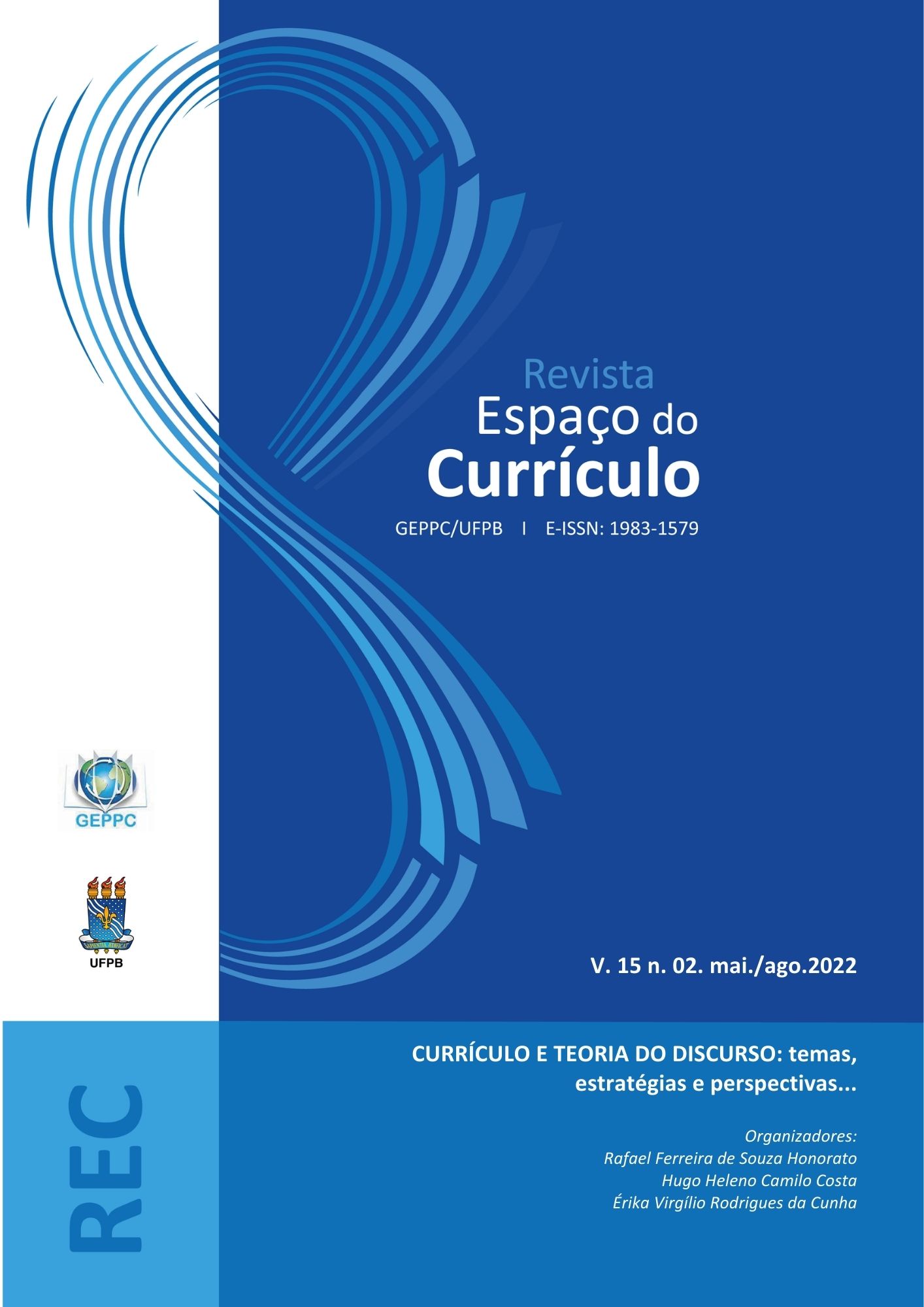CURRICULAR THEORY AND CURRICULAR POLICY
betting on the political commitment to alterity
DOI:
https://doi.org/10.15687/rec.v15i2.63837Keywords:
Curriculum Theory, Curriculum Policy, othernessAbstract
The article focuses on the debate on curriculum theory and curriculum policy in current educational reforms and policies, arguing that such policies attempt to control the other and, in an attempt to respond to what is read as “missing” knowledge, seeks to define centralized knowledge. , excluding differences in policies and curricula. Based on a study and theoretical review, we discuss, in the light of the Theory of Discourse and the contributions of Derrida's thought, the contingent processes of subjectivation of policies, the translation that prevents the control of knowledge, curricula, training, decision-making. and the subject. We provisionally conclude that the conflict around curricular thinking and theories, as well as the dispute over the power to decide what should be taught and learned, has marked the attempt to establish in policies and curricula for rural schools projects of formation that try to control the formation of these peoples and produce universal subjects, disregarding the processes of differing and differences. In this sense, we defend the idea of theory and politics committed and marked by an ethical-political commitment to alterity and deconstruction. We bet on a theory and policy negotiated and produced in the ambivalences and contingencies caused by the processes of differing, committed to alterity in the deconstruction of normativities, of the BNCC.
Downloads
Metrics
References
BHABHA, Homi K. O local da cultura. Belo Horizonte: Editora UFMG, 2013. 2ª edição. Tradução de Myriam Ávila, Eliana Lourenço de Lima Reis, Gláucia Renate Gonçalves.
BRASIL. Ministério da Educação. Base Nacional Comum Curricular. Base Nacional Comum Curricular. (Versão definitiva). Brasília: MEC, 2018.
COSTA, Hugo Heleno Camilo; LOPES, Alice Casimiro. O conhecimento como resposta curricular. In: Revista Brasileira de Educação, v. 27, 2022. Disponível em: https://www.scielo.br/j/rbedu/a/jrPMcNpkw3Pp9XrszTjCr7m/?format=pdf&lang=pt. Acesso em: 25 jun. 2022.
LACLAU, Ernesto. Desconstrução, pragmatismo e hegemonia. In: CRITCHLEY, Simon; DERRIDA, Jacques; LACLAU, Ernesto; RORTY, Richard. MOUFFE, Chantal (org.). Desconstrução e pragmatismo. Tradução: Victor Dias Maia Soares.1 ed. Rio de Janeiro: Mauad X, 2016.
LACLAU, Ernesto; MOUFFE, Chantal. Hegemonia e estratégia socialista: por uma política democrática radical. São Paulo: Inttermeios, Brasília: CNPq, 2015. Tradução de Joanildo A. Burity; Josias de Paula Jr; Aécio Amaral.
LOPES, Alice Casimiro. Teoria pós-críticas, política e currículo. Revista Educação, sociedade e culturas, nº 39, 2013, p. 7- 23.
LOPES, Alice Casimiro. Normatividade e intervenção política: em defesa de um investimento radical. In: LOPES, A. C.; MENDONÇA, D. (Orgs.). A teoria do discurso de Ernesto Laclau: ensaios críticos e entrevistas. São Paulo: Annabrume, 2015.
LOPES, Alice Casimiro; BORGES, Veronica. Currículo, conhecimento e interpretação. In: Revista Currículo sem Fronteiras, v. 17, n.3, p. 555-573, setembro/dezembro, 2017. Disponível em: https://www.curriculosemfronteiras.org/vol17iss3articles/lopes-borges.pdf. Acesso em: 20 jun. 2021.
LOPES, Alice Casimiro; MACEDO, Elizabeth. Uma alternativa às políticas curriculares centralizadas. Roteiro, Joaçaba, v. 46, jan./ dez. 2021. Disponível em: https://portalperiodicos.unoesc.edu.br/roteiro/article/view/27181. Acesso em: 27 jul. 2022.
MACEDO, Elizabeth. A teoria do currículo e o futuro monstro. In: LOPES, Alice Casimiro; SISCAR, Marcos (Orgs.). Pensando a política com Derrida: responsabilidade, tradução e porvir. Cortez Editora, São Paulo, 2018.
MACEDO, Elizabeth. Base Nacional Curricular Comum: Novas formas de sociabilidade produzindo sentidos para educação. Revista e-Curriculum (PUCSP), v. 12, p. 1530-1555, 2014. Disponível em: http://revistas.pucsp.br/index.php/curriculum. Acesso em: 28 mai. 2017.
MACEDO, Elizabeth. Mas a escola não tem que ensinar?: conhecimento, reconhecimento e alteridade na teoria do currículo. Currículo sem fronteiras. V. 17, n. 03, p. 539-554, set. /dez. 2017. Disponível em: https://www.curriculosemfronteiras.org/vol17iss3articles/macedo.pdf. Acesso em: 09 mai, 2021.
OLINI, Polyana; CORAZZA, Sandra Mara. Noologia do Currículo: dramatização do projeto escrileituras. Currículo sem fronteiras, v. 16, n. 3, p. 559-577, set / dez. 2016. Disponível em: https://www.curriculosemfronteiras.org/vol16iss3articles/olini-corazza.pdf. Acesso em: 20 jun. 2021.
PINAR, William F. O que é a Teoria do Currículo? Porto Editora, Portugal, 2007. (Adaptação para Língua Portuguesa de Ana Paula Barros/Sandra Pinto).
RAMOS, Jéssica Rochelly da Silva. CUNHA, Katia Silva (2018b). Políticas de currículo para as escolas do campo: entre negociações e articulações políticas. Revista Currículo sem Fronteiras. v. 18, n. 3, p. 871-894, set./dez. 2018. Disponível em: https://www.curriculosemfronteiras.org/vol18iss3articles/ramos-cunha.pdf. Acesso em: 09 jun. 2021.
THIESEN, Juarez da Silva. O que há no “entre” teoria curricular, políticas de currículo e escola?. Educação, Porto Algere, v. 35, n. 1, p. 129-136, jan./ abr. 2012. Disponível em: https://revistaseletronicas.pucrs.br/ojs/index.php/faced/article/view/7407. Acesso em: 23 jun. 2021.
YOUNG, Michael. Superando a crise na teoria do currículo: uma abordagem baseada no conhecimento. Cadernos Cenpec, São Paulo, v.3, n. 2, p. 225-250, junho/ 2013. (Tradução de Leda Beck e revisão técnica de Paula Louzano).
Downloads
Published
How to Cite
Issue
Section
License
Copyright (c) 2022 Curriculum Space Journal

This work is licensed under a Creative Commons Attribution 4.0 International License.
By submitting an article to Curriculum Space Journal (CSJ) and having it approved, the authors agree to assign, without remuneration, the following rights to Curriculum Space Journal: first publication rights and permission for CSJ to redistribute this article. article and its metadata to the indexing and reference services that its editors deem appropriate.
















